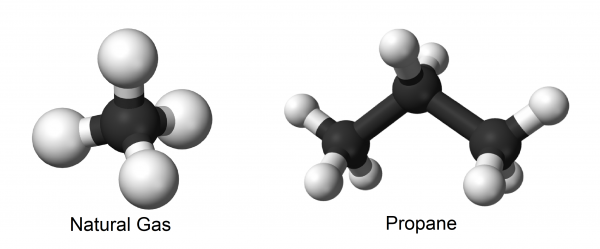Propane vs Natural Gas – What’s the difference?
Maybe you’ve caught yourself thinking, “Hmm, this stove says for natural gas and this one says its for propane. What’s the difference?” While Propane and Natural Gas are both gases, they have some large differences.
Installation:
Many household appliances can run off both propane and natural gas. However, depending on which fuel you are using, the gas utilization fittings will vary. For example, most cookstoves come ready for natural gas already but if you have propane in your house you will need to get the conversion kit. Depending on the manufacturer and purchase location, this kit can either be ordered (usually for free) or will come with the appliance automatically. This kit is a necessity for your technician when he is installing your new cookstove or another appliance.
Storage and Delivery:
Propane is stored in large steel tanks that can be placed either above or below ground and delivered via trucks. Whereas natural gas is delivered to your home via a pipeline. This makes propane a wonderful option for customers who live in more remote areas where the natural gas pipeline does not go. The drawback to propane is that you are limited in storage space by the size of the tank you have. Natural gas is always readily available and continually flowing through the pipeline so there is no fear of a run-out.
One other large benefit of having propane is that you are able to shop for different companies that suit your needs the best. Not all propane companies are created equal! For example, here at Patterson Fuels, when you call you are greeted by a local customer service representative who is ready and able to help you with whatever your needs might be. We offer same-day and emergency service and along with same-day and emergency deliveries. Patterson Fuels is also proud to say that we offer free tank rentals for our propane customers and do not charge a delivery fee for automatic or regularly scheduled deliveries.
Efficiency and Cost:
There is no denying that natural gas is a cheaper heating fuel in Vermont. However, the same amount of propane can produce twice as much heat as natural gas. One cubic foot of propane is equivalent to 2,516 BTUs of heat with one cubic foot of natural gas being equivalent to 1,030 BTU. Either way, both fuels still tend to be cheaper and more efficient than heating your home with electricity.
Chemical Composition:
Natural gas is mostly made up of methane, a greenhouse gas that’s about 84 times more potent than carbon dioxide. Propane is a byproduct of petroleum refining and natural gas processing, along with other hydrocarbons like butane, ethane, and pentane. The other benefit to propane is that if leaked from its storage tank there is no harm to the water or soil around it.

Safety:
Both propane and natural gas are colorless odorless gases. To help detect leaks, manufactures add in a harmless chemical called mercaptan. This chemical has a terrible rotten eggs or sulfur smell to it. If you ever smell this in your home it is important to put out any flames in your home, turn off your electronics and get outside. Propane tanks have a shut off valve on the top of their tanks that can be turned clockwise to immediately shut off the gas supply. If you have a problem with your furnace, your stove, your water heater, or another system powered by propane or natural gas, partially combusted fuel could form carbon monoxide, a colorless, odorless gas that could be deadly. You should use carbon monoxide detectors to warn you if there’s too much carbon monoxide in your home. These devices resemble smoke detectors and should be installed on every floor of your home. These gas detectors are sold at all the large box stores such as Lowes but can also be purchased and installed by our techs here at Patterson Fuels.


